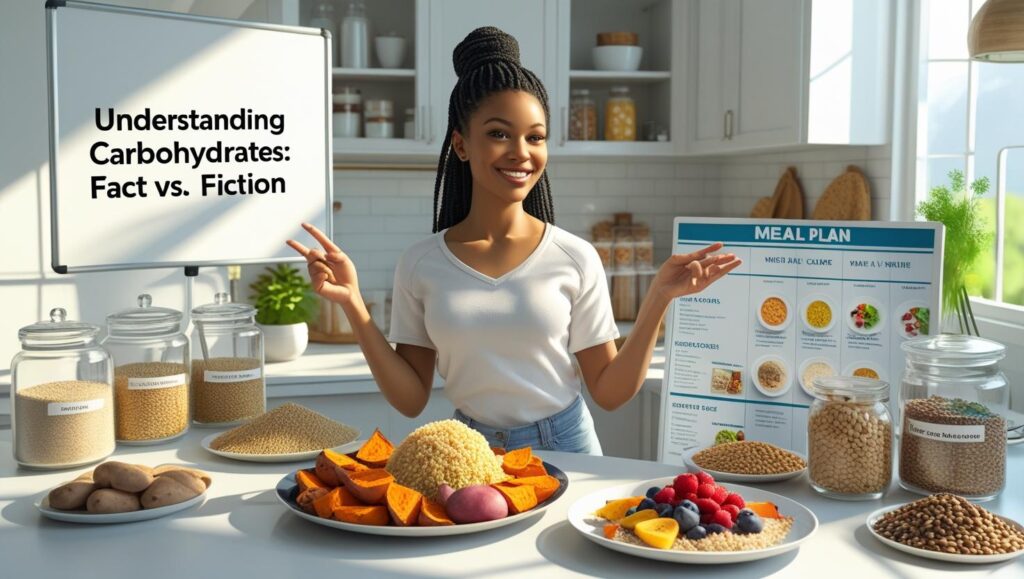Carbohydrates have been a hot topic in nutrition for decades. Some diets praise them as essential energy sources, while others demonize them as the cause of weight gain and chronic diseases. With so much conflicting information, it’s no wonder people are confused:Are carbs bad for you?
The answer isn’t black and white. Carbohydrates are a diverse group of foods, and their impact on health depends on the type, quantity, and individual metabolism. In this blog post, we’ll explore:
- What carbohydrates are and their different types
- The role of carbs in the body
- The debate around carbs and weight gain
- How carbs affect blood sugar and diabetes
- Whether low-carb diets are beneficial
- How to choose the right carbs for optimal health
By the end, you’ll have a clear understanding of whether carbs deserve their bad reputation—and how to include them in a healthy diet.

What Are Carbohydrates?
Carbohydrates are one of the three macronutrients (along with protein and fat) that provide energy to the body. They are found in a wide variety of foods, including:
- Grains (bread, rice, pasta)
- Fruits
- Vegetables
- Legumes (beans, lentils)
- Dairy (milk, yogurt)
- Sugary foods (candy, soda, pastries)
Carbs are broken down into glucose, which is the body’s primary fuel source. However, not all carbs are created equal.
Types of Carbohydrates
Carbohydrates can be classified into three main categories:
- Simple Carbohydrates (Sugars)
- Quickly digested and absorbed
- Found in fruits, milk, honey, and processed sugars (table sugar, high-fructose corn syrup)
- Can cause rapid spikes in blood sugar
- Complex Carbohydrates (Starches)
- Take longer to digest due to their structure
- Found in whole grains, legumes, and starchy vegetables (potatoes, corn)
- Provide sustained energy
- Fiber
- A type of complex carb that the body can’t fully digest
- Found in vegetables, fruits, whole grains, nuts, and seeds
- Supports digestion, gut health, and blood sugar control
The key difference lies in how these carbs affect the body. While simple carbs can lead to energy crashes and cravings, complex carbs and fiber promote long-term health benefits.
The Role of Carbs in the Body
Carbohydrates serve several essential functions:
1. Primary Energy Source
Glucose from carbs is the preferred fuel for the brain, muscles, and organs. Without enough carbs, the body may break down muscle for energy (gluconeogenesis).
2. Supports Brain Function
The brain uses about20% of the body’s energy, primarily from glucose. Low-carb diets can sometimes lead to brain fog and fatigue.
3. Aids Digestion and Gut Health
Fiber from whole carbs feeds beneficial gut bacteria, promoting a healthy microbiome and preventing constipation.
4. Preserves Muscle Mass

When carbs are available, the body uses them for energy instead of breaking down protein (muscle tissue).
5. Enhances Exercise Performance
Athletes rely on glycogen (stored glucose) for endurance and high-intensity workouts. Low-carb diets can impair performance.
Given these crucial roles, cutting out carbs completely isn’t ideal for most people. However, thequalityof carbs matters significantly.
Are Carbs Responsible for Weight Gain?
One of the biggest criticisms of carbs is their alleged role in obesity. But is this really true?
The Carb-Weight Gain Connection
- Excess Calories Matter Most:Weight gain occurs when you consume more calories than you burn—regardless of whether they come from carbs, fats, or protein.
- Processed Carbs vs. Whole Carbs:Refined carbs (white bread, pastries, sugary drinks) are linked to weight gain because they’re calorie-dense and low in fiber, leading to overeating.
- Insulin and Fat Storage:Some argue that carbs spike insulin, promoting fat storage. While insulin does play a role in fat metabolism,total calorie intake is still the primary driver of weight gain.
Do Low-Carb Diets Work Better for Weight Loss?
Low-carb diets (like keto or Atkins) can lead to rapid weight loss, but much of this iswater weight(carbs hold water in the body). Studies show that in the long term,both low-carb and low-fat diets produce similar weight loss resultswhen calories are matched.
The Bottom Line:
Carbs themselves don’t cause weight gain—overeating any macronutrient does.Choosing whole, fiber-rich carbs can actually help with weight management by keeping you full longer.
Carbs and Blood Sugar: Are They Bad for Diabetics?
Another major concern is carbs’ effect on blood sugar, especially for people with diabetes or insulin resistance.
How Carbs Affect Blood Sugar
- Simple carbs (sugar, white bread) cause rapid blood sugar spikes.
- Fiber and complex carbs slow digestion, leading to a gradual glucose release.
Should Diabetics Avoid Carbs?
No—but they should prioritize:
✅Low-glycemic index (GI) carbs(whole grains, legumes, non-starchy veggies)
✅High-fiber foods(chia seeds, oats, broccoli)
✅Balanced meals(carbs + protein + healthy fats to slow absorption)
Myth:“All carbs are bad for diabetics.”
Truth:The right carbs in controlled portions can be part of a diabetes-friendly diet.
Are Low-Carb Diets Healthier?
Low-carb diets (like keto) have gained popularity for weight loss and metabolic health. But are they superior?
Potential Benefits of Low-Carb Diets
- Short-term weight loss(mostly water and fat loss)
- Improved blood sugar control(helpful for type 2 diabetes)
- Reduced cravings(due to stable blood sugar)
Potential Downsides of Low-Carb Diets
- Nutrient deficiencies(lack of fiber, vitamins from fruits and whole grains)
- Low energy and fatigue(especially for athletes)
- Digestive issues(constipation from lack of fiber)
- Unsustainability(many people struggle to maintain extreme carb restriction long-term)
Who Might Benefit from Low-Carb?

- People with insulin resistance or type 2 diabetes
- Those trying to lose weight quickly (short-term)
- Individuals who feel better on fewer carbs
Who Should Be Cautious?
- Athletes or highly active individuals
- People with thyroid or hormonal imbalances
- Those with a history of disordered eating
The Verdict:Low-carb diets can be useful for some, but they’re not necessary—or optimal—for everyone.
How to Choose the Right Carbs for Optimal Health
Instead of fearing all carbs, focus onquality and balance.
Best Carbs to Eat
✔Whole grains(quinoa, brown rice, oats)
✔Fruits(berries, apples, bananas in moderation)
✔Vegetables(leafy greens, broccoli, carrots)
✔Legumes(lentils, chickpeas, black beans)
✔High-fiber foods(chia seeds, flaxseeds, psyllium husk)
Carbs to Limit or Avoid
❌Refined grains(white bread, white rice, pastries)
❌Added sugars(soda, candy, sugary cereals)
❌Processed snacks(chips, crackers, instant noodles)
Tips for a Balanced Carb Intake
- Pair carbs with protein/fat(e.g., apple + almond butter) to slow digestion.
- Choose high-fiber options(aim for 25–30g of fiber daily).
- Watch portion sizes(even healthy carbs can lead to weight gain in excess).
- Listen to your body(some people thrive on more carbs, others on fewer).
Final Answer: Are Carbs Bad for You?
No, carbs are not inherently bad.The problem lies in:
- Overconsumption of refined carbs and sugars
- Low fiber intake
- Poor overall diet quality
Healthy carbs are essential for energy, brain function, digestion, and long-term health.Instead of cutting them out completely, focus on:
✅ Eatingwhole, minimally processed carbs
✅ Balancing carbs with protein and healthy fats
✅ Adjusting intake based on your activity level and health goals
The Bottom Line
Carbs are not the enemy—poor food choices are.By selecting nutrient-dense, fiber-rich carbs and avoiding processed junk, you can enjoy carbs without guilt while supporting your overall health.
What’s your experience with carbs? Do you feel better on a higher or lower-carb diet? Share your thoughts in the comments!
![]()






